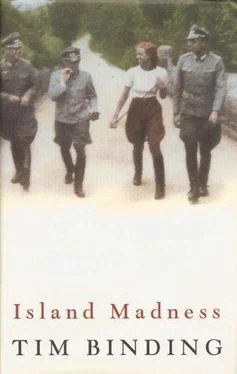“But Captain Zepernick left the party with Miss Vaudin, is that not right?” Ned decided to call him by his formal name. With her connections Molly could make life difficult for him, and they both knew it.
“No, that is not right.” Her voice had lost its sense of play. She got up and fastened the clasp. “He did not ‘leave’ the party at all. He was called away when they found her. Of course we didn’t know then that it was Isobel. He gave Veronica a lift home. She lives in one of those dingy fisherman’s cottages by Cobo Bay. With her mother and father. Very cosy.”
Ned refused to rise to the bait.
“And he was there in the club all the time before that, and during the party.”
“Absolutely. We got changed here at about seven and left for the club about half past. Isn’t that right Albert?”
Albert nodded.
“Zep dropped me off at Underwood’s. Veronica had decided to get changed in her consulting room. Her father’s a bit of an old stick-in-the-mud. He wouldn’t have approved of her dress at all. No back and precious little front. Even I thought she was in danger of—how shall I put it—over-egging the puddings.” She laughed at her little joke. “We had a quick drink in one of the hotel bars along the way and arrived at the Casino around eight, coming back here at around eleven. And from then on, until the Captain left, all of us were here all the time. Albert can vouch for that.”
“You know where Isobel was found?”
“The Captain told me, yes.”
“Have you ever been in one of those bunkers? Has the Captain ever taken you there?”
“No. Why on earth should he? They’re out of bounds.”
“Seeing as you’re a favoured guest, I was wondering if you’d been given a special tour. If you had been there, you might have told someone else about it.”
“Why on earth should I want to see round a hole in the ground?” She looked at her small gold-chained watch. Another present from the Captain? “Look, can we do this some other time? I have an appointment which I really shouldn’t miss.”
She put her hand inside her cape and pressed it flat against her stomach, wincing slightly as she felt its swell.
“The doctor!” he exclaimed. “You should have said.”
“No.” She sounded light, airy, full of brimming confidence. “Underwood’s. I’m having a new dress made up. My first fitting.”
“Been saving the coupons, then?”
Molly smiled. “Something like that.”
“Something special, is it?”
“A party.” She looked around the kitchen. “I just love parties, don’t I, Albert?”
Walking down the drive Ned saw the Captain’s car coming up the drive. He stepped on the grass to let it pass. The car slowed down, the engine running. The roof was open and the Captain held his hat between his legs. He stared forward and waited. Ned bit his lip and saluted.
“Captain.”
Zepernick leant across and waved an envelope at him.
“I was going to have Wedel deliver this today. Take it now.”
“What is it? A special pass?”
“Special pass! No! It is to do with your dress.”
“My dress? I don’t understand, Captain.”
The Captain looked out to where Molly stood in the doorway. He looked at his watch and waved.
“Your uniforms,” he said. “You and your cadets.”
“Constables.”
“You need to be smarter. The island does not look good with such costumes. Read.”
Zepernick gunned the car up the drive. Ned tore the envelope open. Inside was a letter headed with the Feldkommandantur stamp. Two letters addressed to him in two days, almost a record. The first paragraph was some piffle about sloppy attire; ties not straight, boots not polished, buttons hanging off the jacket. And then this: Consequently, beginning this Wednesday, the entire police force will present itself to Underwood’s the tailors where provision has been made for measurements and fittings to be taken for a complete set of new uniforms. New uniforms will be issued the following month on April 15th. They will be made in strict accordance to the specifications of British Policemen. The cost will be met from existing police funds. Any policemen found to be wearing their old uniforms after that date will be fined five shillings and suspended without pay for one week. The maintenance of these new uniforms will be solely the owners’ responsibility.
Signed, Captain R. Zepernick.
“Underwood’s again,” Ned said out loud, screwing the letter into a ball. “I’m in the wrong bloody business.”
Albert stands by the granite grave in the churchyard. In his hand he holds a bunch of wild primroses. They have come early this year and he is glad, for he would not have liked to have left without seeing the first flowers of spring peeking through one more time. It will, he reckons, be what he will miss the most, the flowers and the way they cover the island in such sudden profusion.
It is a bare, ungainly grave with a square cut of gravel on which stands a small vase. The inscription reads: Rose Luscombe, Wife to Albert, Mother to Kitty, Mum to Both .
The flowers are fresh as always, for Albert comes here every other day to replace the old with the new. Sometimes he brings cultivated flowers from the greenhouse, sometimes ones picked from the garden, and, when he can, wild flowers from the verges and hedgerows, gathered with an eye to their composition as he walks the two miles to where she is buried. There are tears in his eyes, as constant an accompaniment as the flowers in his hands, a mark of an irredeemable sorrow he carries within and which grows more acute at each visit. Alone, up at the House, looking after these strangely attractive men, his brother gone too, he feels her loss more than ever, for the island has become a contemptuous territory, both familiar and utterly foreign. It is not the wail of the siren nor the pulse of marching feet that has set his mind against his homeland, but the cries of those he has known all his life, now choking before his very eyes in a sea of greed and suspicion. Let them go under! Let them drown! He will not help them! He talks to her now, talking as he did when she was alive, for contrary to folklore it was always Albert who would return with the gossip he had gathered from the Hallivands’ floor or supped down at the Britannia, while it was Rose, crippled with arthritis, who would sit in her chair and sniff, but unlike former times he takes no pleasure in his tales. He talks to her now, of the island’s perfidy, of its moral loss, mentioning names that were once their everyday companions, all the time looking out to the sea, wondering where their daughter is. He knows that he will never see her again, that she is lost to him, gone for ever. He has not heard from her since she left that Tuesday before the invasion, him pushing her off, feeling the tears in the back of his throat, wanting to take her in his arms and hug the very essence of her into him, dying to tell her, as he pretended to be so unconcerned, so cheerful, that he would always love her, always miss her, fearing the very worst. As he says out loud to his dead wife lying but four feet below him, it’s the not knowing where she is that’s the worry. London, Birmingham, Coventry, there had been some terrible bombings over there, whole areas ablaze, and though he did not believe the ninety per cent of lies that passed for news on the front pages of the Star , the ten per cent of truth would be enough to blow their Kitty to smithereens. It makes him angry to think that it should have come to this, makes him want to curse, but being where he is he bites his lip. Kitty would have been safer here, he tells her, blaming himself yet again for marching their daughter down to the quayside, with a bundie of clothes in a borrowed suitcase, a set of tulip bulbs wrapped in secret in her nightgown that she might grow in memory of him, and a letter of introduction from Mrs Hallivand to the hostel at Weymouth, hoping that she might find work there. But then who knows, she might have taken up with them, like so many other girls of her age. It isn’t their class or lack of upbringing that has turned their heads, Albert is convinced, it is their age. All their young life they’ve been told what to do, what to say, how to behave, their future set out like their mothers’ and grandmothers’ before them, and suddenly the plan has been torn up, and they’ve been handed a licence to do as they please—and fresh male company to do it with besides. And what can their elders do? The young hold the power now, and by God they know how to use it. He has never seen women of such little worth wield such authority; a father betrayed after forbidding his daughter to stay out late; lipsticked bevies of them walking arm in arm down the Pollet, lording it over the ration queues; whole families in thrall to the eighteen-year-old who just might get her father work if they let her shame their name. There is nothing these girls can’t do, except jump on a boat and leave, and the younger they are, the more shameless and ungodly their behaviour. Only this afternoon he’d seen a couple of brazen little beasts—troop carriers (it shamed him even as he spoke their epithet)—strutting past, holding their swollen stomachs out as proudly if they’d had the Iron Cross pinned upon them. “Couldn’t have looked happier if they’d been…” he draws in a deep breath, knowing his wife’s antipathy to such talk, “by—himself.”
Читать дальше












